形容词变副词规律总结 (图表)
形容词变副词规则

形容词变副词规则
1. 以-e结尾的形容词,将-e去掉,加上-y,例如:true(真实的)
→ truly(真实地);
2. 以-y结尾的形容词,将-y去掉,加上-ily,例如:happy(快乐的)→ happily(快乐地);
3. 大部分以-l结尾的形容词,将-l去掉,加上-y,例如:usual
(通常的)→ usually(通常地);
4. 以-le结尾的形容词,将-le去掉,加上-y,例如:simple(简单的)→ simply(简单地);
5. 以-ic结尾的形容词,直接加上-ally,例如:fantastic(极好的)→ fantastically(极好地);
6. 以-le结尾的形容词,去掉-le,变成一个新的单词,并在末尾加
上-ly(注意这个规则只适用于full、plenty、early和daily),例如:full(完全的)→ fully(充分地),early(早的)→ early(早地);
7. 一些形容词的副词形式是不规则的,需要记忆,例如:good(好的)→ well(好地)。
需要注意的是,不是所有形容词都能直接变成副词,有些形容词的副
词形式是不变的,需要单独记忆,例如:fast(快的)→ fast(快地)。
此外,还有一些形容词的副词形式和形容词形式相同,例如:hard(努力的)→ hard(努力地)。
最好的学习方法是通过阅读和积累来掌握形容
词变副词的规律和不规律。
形容词变副词规律

形容词变副词通常是加ly,其变化有规律可循,请记住以下口诀:一般直接加,“元e”去e加y,“辅y”改i加,“le”结尾e改y。
分别举例如下:quick-quickly; true-truly;happy-happily; pssible-possibly具体规则如下:1.一般情况下直接加“ly”,如:quick-quickly;polite-politely;sad-sadly;imediate-immediately;recent-recently 2.少数以e结尾的形容词,要去掉e再加-ly。
如:true-truly; due-duly绝大多数辅音字母加e结尾的形容词直接加-ly。
如:polite-politely;wide-widely;wise-wisely;nice-nicely3.以“y”结尾的,且读音为/ i /,先将“y”改成“i”,再加“ly”,如:happy-happily;heavy-heavily;angry-angrily;busy-busily但是如果读音为/ ai /,直接加ly,如:dry-dryly; sly-slyly;shy---shyly4.以ic结尾的词,加ally,如:economic-economically;basic-basically;scientific-scientifically;automatic-automatically; energetic-energetically; 但是public-publicly例外。
5.以辅音字母加le结尾时,去e加y,如:simple-simply;considerable-considerably;terrible-terribly comfortably gentle-gently;possible-possibly;probable-probably; incredible-incredibly元音字母加le时加ly,如:sole-solely。
形容词变副词的规则.ppt

lonely deadly manly \ womanly daily silly
monthly \weekly \yearly
brotherly \ fatherly \motherly
9. 有两个副词形式的词 high—high \ highly deep—deep\deeply wide—wide\widely hard—hard \ hardly loud—loud \ loudly close—close \ closely late—late \ lately
7.注意以下形容词变副词的拼写 true— truly whole— wholly sole— solely full— fully dull— dully shrill— shrilly good-- well
8.注意以ly结尾的形容词
friendly lovely lively elderly
lunch. nearly
• 7. high高 highly高度地,非常地
• a) All the teachers speak _h_i_g_h__ly_____ of her.
• b)The plane flewh__ig__h__ in the sky and soon dis
appeared.
• 8. deep深,迟 deeply抽象意义的“深”
• a) I am _d_e_e_p__lygrateful for your timely
help.
• b) He often studied _d_e_e_p__ into the night.
• 9. loud大声地 loudly大声地(含有喧闹的意思)
• a) I can’t hear you; please speak ______.
英语中形容词变副词的变化规律

英语中形容词变副词的变化规律
(一)基本变化规律
1.一般形容词在前缀加“more”或“less”,变成副词。
例如:large ——> largely
2.以“e”结尾的形容词,通常只需要在形容词前加“more”或“less”即可变成副词。
例如:large ——> more largely
3.以“y”结尾的形容词,变副词时,一般要把“y”改成“i”,再加“ly”。
例如:happy ——> happily
4.以重读闭音节结尾的形容词,变副词时,一般要双写最后一个字母,再加“ly”。
例如:thin ——> thinly
5.以辅音字母加“y”结尾的形容词,变副词时,一般要双写最后一个字母,再加“ily”。
例如:shy ——> shyly
(二)其他变化规律
1.以辅音字母+“o”结尾的形容词,变副词时,一般加“ly”。
例如:narrow ——> narrowly
2.以“y”结尾的双音节形容词,变副词时,一般不变,直接加“ly”。
例如:angry ——> angrily
3.有双重含义或有不同含义的形容词,变副词时,一般有特殊规定。
形容词变副词的规则

形容词变副词的规则1.一般情况下直接加“ly”,如quick---quickly2.以“y”结尾的,先将“y”改成“i”,再加“ly”,如happy---happily3、少数以e结尾的形容词,要去掉e再加-ly。
例如:true-truly等。
但绝大多数以e结尾的形容词仍然直接加-ly。
例如:polite-politely, wide-widely等。
形容词变副词通常是加ly,其变化有规律可循,请记住以下口诀:一般直接加,“元e”去e加,“辅y”改i加,“le”结尾e改y。
分别举例如下:quick—quickly,true—truly,happy—happily,possible—possibly.另外:一、在形容词词尾直接加-ly。
如:real-really; helpful-helpfully; careful-carefully; hopeful-hopefully; slow-slowly; quick-quickly; quiet-quietly二、以辅音字母加y结尾的形容词要变y为i,然后再加-ly。
如:busy-busily; angry-angrily; easy-easily三、某些以辅音字母加不发音的字母e结尾和以-ue结尾的形容词要先去掉e,然后再加-y或-ly。
如: terrible-terribly; true-truly;gentle-gently另外,副词还可以由形容词加前缀a-得来,如:loud (adj.)-aloud (adv.此外,部分名词加后缀也可变成副词,如:part-partly。
例句: It is partly her fault. 有部分是她的错。
需注意: friendly; motherly; lovely等词是形容词而非副词。
再看转化副词。
在英语中,有些词既可以作形容词,又可以作副词,如early, much, fast, little, wide, loud等。
形容词变副词变化规则ppt课件

③以le结尾时,去e加y,如:
simple---simply; considerable---considerably;
terrible---terribly; gentle---gently; possible---
possibly; probable---probably; incredible---
整理版课件
6
5). 以-ll结尾时,只须加 –y,如: dull---dully;
注意: 有些以ly结尾的词是形容词而非副词。 如:
friendly people; motherly care; lovely dog;
整理版课件
7
感谢亲观看此幻灯片,此课件部分内容来源于网络, 如有侵权请及时联系我们删除,谢谢配合!
整理版课件
5
4).以ic 结尾的词,加ally,如:
economic---economically; basic---basically; scientific---scientifically; automatic--automatically; energetic---energetically
incredibly
整理版课件
4
3). 以―个y结尾的,且读音为 / i /, 先将y改 成i,再加ly,如:
happy---happily; heavy---heavily; angry---angrily; busy---busily 但是如果读音为 / ai /, 直接加ly,如:
dry-dryly; shy---shyly
形容词变副词变化规则
整理版课件
1
1. 一般情况直接加-ly 2. 以-e结尾的①少数去e加ly
②绝大多数直接加-ly ③以-le结尾变为-ly 3. 以-y结尾的①读/i/ 把y变i加-ly ②读/ai/直接加-ly 4. 以-ic结尾的,加-ally 5. 以-ll结尾,直接加-y
形容词变副词的规则课件

arge large large ice nice nice ine fine fine
较级,加上st表示最高级。
3 以辅音字母+y 结尾的,把消去y,然后加 上er表示比较级;加上 est表示最高级。 原级 比较级 最高级 1)early early early 2) happy happy happy
有两个副词形式的词
01
high—high \ highly
02
deep—deep\deeply
03
wide—wide\widely
04
hard—hard \ hardly
05
loud—loud \ loudly
06
close—close \ closely
07
late—late \ lately
probable— probably
incredible— incredib01
wise— wisely
02
nice— nicely
03
polite— politely
04
fortunate— fortunately
lonely deadly manly \ womanly daily silly
添加标题
形容词与副词 同形
添加标题
fast—fast
添加标题
early—early
添加标题
hard—hard
添加标题
late—late
添加标题
far—far
添加标题
alone—alone
添加标题
little--little
direct adj. 直的 adv.直线地,不绕圈子地 directly adv. 直接地;马上,立刻 firm adj. adv. 稳固地;稳定地 stand~ firmly adv. 坚定地,坚决地 high adj. 高的 adv. 高高地 highly adv. 高度地; straight adj. 直的 Adv.直接地;正直地;马上; straightly adv. (比较少用)
形容词变副词的变化规则
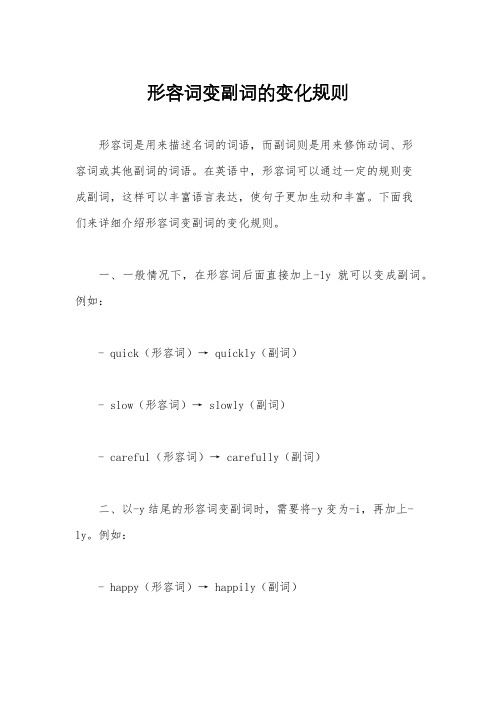
形容词变副词的变化规则形容词是用来描述名词的词语,而副词则是用来修饰动词、形容词或其他副词的词语。
在英语中,形容词可以通过一定的规则变成副词,这样可以丰富语言表达,使句子更加生动和丰富。
下面我们来详细介绍形容词变副词的变化规则。
一、一般情况下,在形容词后面直接加上-ly就可以变成副词。
例如:- quick(形容词)→ quickly(副词)- slow(形容词)→ slowly(副词)- careful(形容词)→ carefully(副词)二、以-y结尾的形容词变副词时,需要将-y变为-i,再加上-ly。
例如:- happy(形容词)→ happily(副词)- busy(形容词)→ busily(副词)三、以-le结尾的形容词变副词时,通常将-le变为-ly。
例如: - gentle(形容词)→ gently(副词)- simple(形容词)→ simply(副词)四、有些形容词的变化规则比较特殊,需要记忆。
例如:- good(形容词)→ well(副词)- hard(形容词)→ hard(副词)- fast(形容词)→ fast(副词)五、有些形容词的副词形式与形容词形式完全相同,例如:- early(形容词)→ early(副词)六、有些形容词的副词形式是不规则的,需要通过阅读和积累来记忆。
例如:- high(形容词)→ high(副词)- low(形容词)→ low(副词)在英语中,副词的使用非常广泛,它可以修饰动词、形容词或其他副词,使句子更加丰富多彩。
因此,掌握形容词变副词的变化规则对于提高英语表达能力非常重要。
希望以上介绍能够帮助大家更好地掌握形容词变副词的变化规则,从而在日常生活和学习中更加流利地运用英语。
英语词性转换(形容词转化为副词的一般规则)

英语词性转换——形容词转化为副词的一般规则形容词变副词通常是加ly,其变化有规律可循,请记住以下口诀:一般直接加,―元(e)去e加,―辅(y)改i加,le结尾e改y。
分别举例如下:quick---quickly; true---truly; happy---happily; possible----possibly 具体规则如下:1) .一般情况下直接加―ly,如:quick---quickly; polite---politely; sad---sadly; immediate---immediately; recent---recently2). 少数以e结尾的形容词,要去掉e再加-ly。
如:true-truly; due-duly绝大多数辅音字母加e结尾的形容词直接加-ly。
如:polite-politely; wide-widely; wise-wisely; nice-nicely3). 以―个y结尾的,且读音为/ i /,先将―y改成―i,再加―ly,如:happy---happily; heavy---heavily; angry---angrily; busy---busily但是如果读音为/ ai /,直接加ly,如:dry-dryly; sly-slyly; shy---shyly4).以ic结尾的词,加ally,如:economic---economically; basic---basically; scientific---scientifically; automatic---automatically; energetic---energetically5).以辅音字母加le结尾时,去e加y,如:simple---simply; considerable---considerably; terrible---terribly; gentle---gently; possible---possibly; probable---probably; incredible---incredibly元音字母加le时加ly,如:sole-solely。
英语形容词变副词规则(名词改为介词)
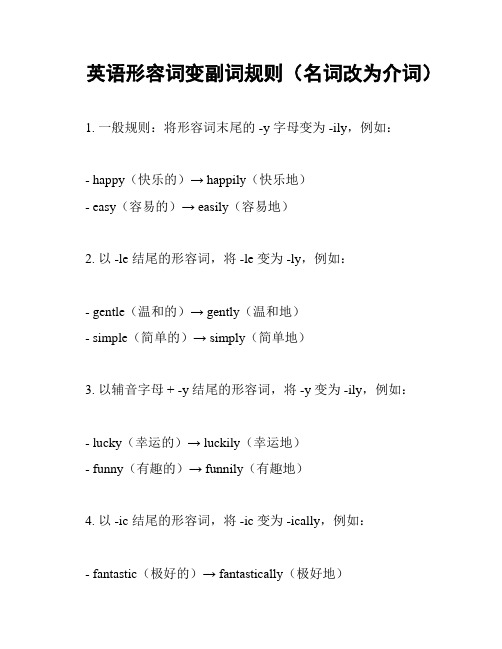
英语形容词变副词规则(名词改为介词)1. 一般规则:将形容词末尾的 -y 字母变为 -ily,例如:- happy(快乐的)→ happily(快乐地)- easy(容易的)→ easily(容易地)2. 以 -le 结尾的形容词,将 -le 变为 -ly,例如:- gentle(温和的)→ gently(温和地)- simple(简单的)→ simply(简单地)3. 以辅音字母 + -y 结尾的形容词,将 -y 变为 -ily,例如:- lucky(幸运的)→ luckily(幸运地)- funny(有趣的)→ funnily(有趣地)4. 以 -ic 结尾的形容词,将 -ic 变为 -ically,例如:- fantastic(极好的)→ fantastically(极好地)- economic(经济的)→ economically(经济地)5. 特殊规则:- good(好的)→ well(好地)- fast(快的)→ fast(快地)- hard(困难的)→ hard(努力地)注意:以上三个形容词没有明确的副词形式,需要使用其他形式来代替。
请注意,以上规则仅提供了一般性的变化规律,实际使用中还需根据具体情况进行灵活运用。
---This document outlines the rules for transforming adjectives into adverbs in English by changing nouns to prepositions.1. General Rule: Change the "-y" at the end of an adjective to "-ily," for example:- happy → happily- easy → easily2. For adjectives ending in "-le," change "-le" to "-ly," for example:- gentle → gently- simple → simply3. For adjectives ending in a consonant letter followed by "-y," change "-y" to "-ily," for example:- lucky → luckily- funny → funnily4. For adjectives ending in "-ic," change "-ic" to "-ically," for example:- fantastic → fantastically- economic → economically5. Special Cases:- good → well- fast → fast- hard → hardNote: The above three adjectives do not have clear adverb forms and require alternative forms to express adverbial meaning.Please note that the above rules provide general patterns for transformation, and flexibility is required in actual usage based on specific situations.。
形容词变副词规律总结

填空练习(源自江苏各地中考真题)1. Mrs White smiled _____ ( happy) when she received a present from her daughter.2. Why do you think you did so ___________(terribe)in your test?3. We can __________(easy) forgive a child who is afraid of the dark, but we can’t forgive an adult who is afraid of the light.4. Congratulations! You’ve answered all the questions _________(correct).5. The computer is ______( wide)used in our daily life. We can do many things with it.6. I changed into my sports shoes so that I could walk more ____________(comfortabe).7. Mary passed her examination because she studied very ________( hard ).8. “Why didn’t you tell me earlier?” The boss shouted _______(angry).9. It’s ___(true) possible that robot teachers will be popular in schools some day.10. How _________(comfortable) the giant pandas are living in Taiwan!11. Miss Xu sm iled and said to me ________(soft), “Never mind, my boy!”12. Last night it rained __________(heavy) in the southern part of the city.13. Simon hates to be like others, he often tires to do everything ______(different).14. ----Where is Peter from? ----He is French, if I remember _________(correct).15. The children clapped their hands _________(excited) as soon as the astronauts appeared on the stage.16. Tom had an accident yesterday. His teacher sent him to the hospital ____(quick).17. We should speak to the old man _________(polite)18. I’m _______(true) sorry I can’t go with you. I have a lot to do this afternoon.19. Nancy is patient and she doesn’t give up ________(easy).father was looking _____ (angry) at him because he had made a serious mistake. walked _______(quiet) into the room not to wake up his grandpa.22. How _______(quick) Betty answered the teacher’s question!23. The firemen have saved the boy from the fire ____________(successful). Keys: 1. happily 3. easily 4. correctly 5. widely 6. comfortably 7. hard 8. angrily 9. truly 10. comfortably 11. softly 12. heavily 13. differently14. correctly 15. excitedly 16. quickly 17. politely 18. truly 19. easily 20. angrily21. quietly 22. quickly 23. successfully。
形容词变副词变化规则ppt课件
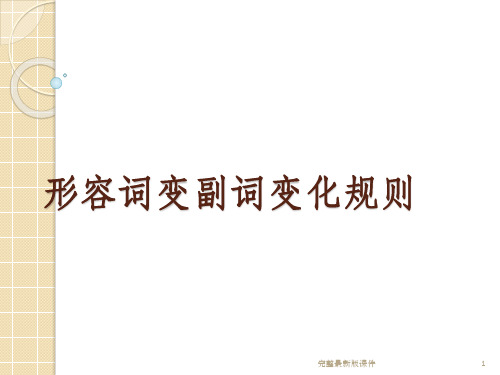
完整最新版课件
5
4).以ic 结尾的词,加ally,如:
economic---economically; basic---basically; scientific---scientifically; automatic--automatically; energetic---energetically
如:polite-politely; wide-widely; wise-wisely; nice-nicely; immediate-immidiately
③以le结尾时,去e加y,如:
simple---simply; considerable---considerably; terrible---terribly; gentle---gently; possible--possibly; probable---probably; incredible--incredibly
形容词变副词变化规则
完整最新版课件
1
1. 一般情况直接加-ly 2. 以-e结尾的①少数去e加ly
②绝大多数直接加-ly ③以-le结尾变为-ly 3. 以-y结尾的①读/i/ 把y变i加-ly ②读/ai/直接加-ly 4. 以-ic结尾的,加-ally 5. 以-ll结尾,直接加-y
完整最新版课件
完整最新版课件
6
5). 以-ll结尾时,只须加 –y,如: dull---dully;
注意: 有些以ly结尾的词是形容词而非副 词。如:
friendly people; motherly care; lovely dog;
完整最新版课件
7
此课件下载可自行编辑修改,此课件供参考! 部分内容来源于网络,如有侵权请与我联系删除!感谢你的观看!
专题一形容词变副词规律小结
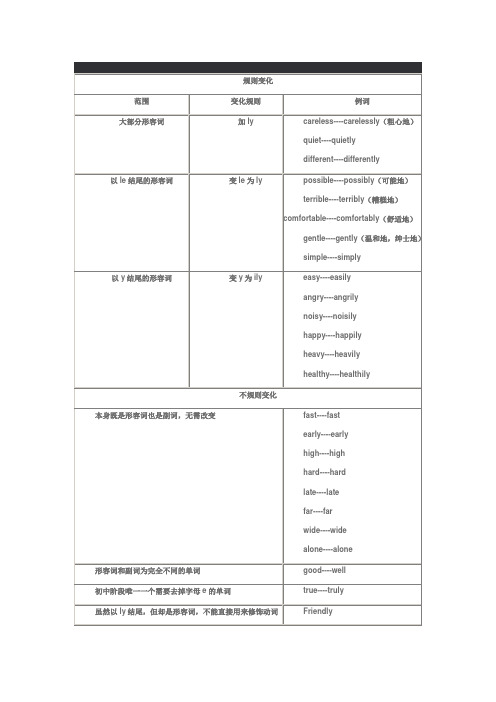
free的意思是"免费";freely的意思是"无限制地"
You can eat free in my restaurant whenever you like.
You may speak freely; say what you like.
特别容易犯错的副词
形容词
副词
备注
3)deep与deeply
deep意思是"深",表示空间深度;deeply时常表示感情上的深度,"深深地"
He pushed the stick deep into the mud.
Even father was deeply moved by the film.
4)high与highly
high表示空间高度;highly表示程度,相当于much
comfortable----comfortably(舒适地)
gentle----gently(温和地,绅士地)
simple----simply
以y结尾的形容词
变y为ily
easy----easily
angry----angrily
noisy----noisily
happy----happily
heavy----heavily
The plane was flying high.
I think highly of your opinion.
5)wide与widely
wide表示空间宽度;widely意思是"广泛地","在许多地方"
He opened the door wide.
English is widely used词容易写成hardly, hardly意思为“几乎不”,与hard无任何关系
总结不规则变化的形容词
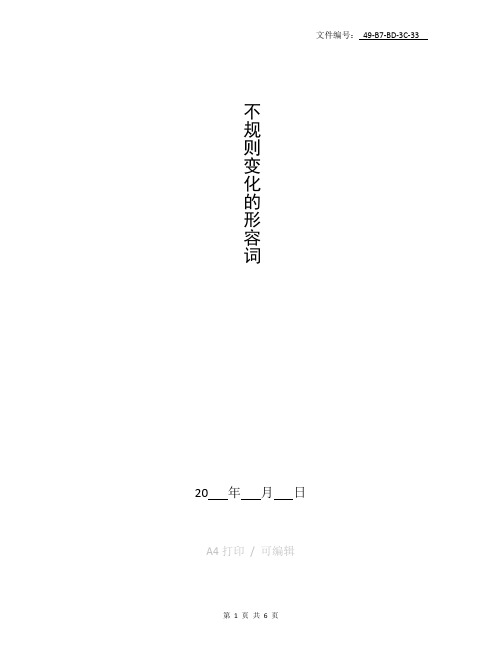
hard副词容易写成hardly, hardly意思为“几乎不”,与hard无任何关系
friendly
无
不能用friendly直接修饰动词,只能改成in a friendly way“用一种友好的方式”。如:He smiled at me in a friendly way.
excited
excitedly
形容词和副词为完全不同的单词
good----well
初中阶段唯一一个需要去掉字母e的单词
true----truly
虽然以ly结尾,但却是形容词,不能直接用来修饰动词
friendly
lively
lovely
lonely
Likely
有些形容词本身即为副词,同时也有加ly的副词形式。但加不加ly意思不一样,使用时需注意
容易拼错
healthy
healthily
容易拼错
பைடு நூலகம்polite
politely
不用去掉字母e。类似的词还有:widely, nicely, closely,
整理丨尼克
本文档信息来自于网络,如您发现内容不准确或不完善,欢迎您联系我修正;如您发现内容涉嫌侵权,请与我们联系,我们将按照相关法律规定及时处理。
terrible----terribly
comfortable----comfortably
gentle----gently
simple----simply
以y结尾的形容词
变y为ily
easy----easily
angry----angrily
noisy----noisily
happy----happily
heavy----heavily
- 1、下载文档前请自行甄别文档内容的完整性,平台不提供额外的编辑、内容补充、找答案等附加服务。
- 2、"仅部分预览"的文档,不可在线预览部分如存在完整性等问题,可反馈申请退款(可完整预览的文档不适用该条件!)。
- 3、如文档侵犯您的权益,请联系客服反馈,我们会尽快为您处理(人工客服工作时间:9:00-18:30)。
形容词变副词规律总结(图表)已仔细核对,无错误,可放心下载
1. Mrs White smiled _____ ( happy) when she received a present from her daughter.
2. Why do you think you did so ___________(terribe)in your test?
3. We can __________(easy) forgive a child who is afraid of the dark, but we can’t forgive
an adult who is afraid of the light.
4. Congratulations! Y ou’ve answered all the questions _________(correct).
5. The computer is ______( wide)used in our daily life. We can do many things with it.
6. I changed into my sports shoes so that I could walk more ____________(comfortabe).
7. Mary passed her examination because she studied very ________( hard ).
8. “Why didn’t you tell me earlier?” The boss shouted _______(angry).
9. It’s ___(true) possible that robot teachers will be popular in schools some day.
10. How _________(comfortable) the giant pandas are living in Taiwan!
11. Miss Xu smiled and said to me ________(soft), “Never mind, my boy!”
12. Last night it rained __________(heavy) in the southern part of the city.
13. Simon hates to be like others, he often tires to do everything ______(different).
14. ----Where is Peter from? ----He is French, if I remember _________(correct).
15. The children clapped their hands _________(excited) as soon as the astronauts appeared on the stage.
16. Tom had an accident yesterday. His teacher sent him to the hospital ____(quick).
17. We should speak to the old man _________(polite)
18. I’m _______(true) sorry I can’t go with you. I have a lot to do this afternoon.
19. Nancy is p atient and she doesn’t give up ________(easy).
20.His father was looking _____ (angry) at him because he had made a serious mistake.
21.Mike walked _______(quiet) into the room not to wake up his grandpa.
22. How _______(quick) Betty answered the teache r’s question!
23. The firemen have saved the boy from the fire ____________(successful).
Keys: 1. happily 2.terribly 3. easily 4. correctly 5. widely 6. comfortably
7. hard 8. angrily 9. truly 10. comfortably 11. softly 12. heavily 13. differently
14. correctly 15. excitedly 16. quickly 17. politely 18. truly 19. easily 20. angrily 21. quietly 22. quickly 23. successfully。
